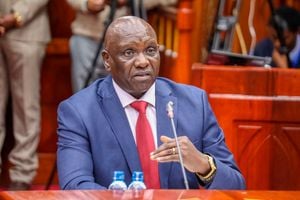Nigeria comes out of recession but food inflation, unemployment erode gains

An aerial view of Lagos, the economic capital of Nigeria.
Hit by recession in mid-2020, the second in three years, Nigeria has recovered as it records a slight growth in Gross Domestic Product (GDP), but a continuous spike in food inflation and unemployment have eroded the gains.
The National Bureau of Statistics (NBS) said on Thursday that Nigeria’s GDP grew by 0.11 per cent in quarter four (Q4) 2020, from the 6.11 per cent contraction in third quarter, signalling a recovery from recession.
The Bureau said that in spite of the growth in GDP, Nigeria has recorded 12 months of successive rise in food inflation which again rose to 16.47 per cent in January 2021, a 0.71 per cent higher than 15.75 per cent recorded in December 2020.
Experts attributed the inflation to increasing hostility, banditry and insurgency which combined to threaten food production in rural areas.
This rise in inflation was caused by increases in prices of bread and cereals, potatoes, yam and other tubers, meat, fruits, vegetable, fish and oils and fats.
The highest increases were recorded in prices of passenger transport by air, medical services, hospital services, passenger transport by road, pharmaceutical products and paramedical services.
Others are repair of furniture, vehicle spare parts, motor cars, miscellaneous services relating to the dwelling, maintenance and repair of personal transport equipment.
“The urban inflation rate increased by 17.03 per cent (year-on-year) in January from 16.33 per cent recorded in December 2020, while the rural inflation rate increased by 15.92 per cent in January from 15.20 per cent in December,” the report noted.
Unemployment has also peaked due to thousands of farmers denied their livelihoods by rampaging insurgents that have made their stay in farms insecure.
The number of jobless people in Nigeria, Africa’s largest economy, increased to over 21 million, about 21 per cent increase in the second quarter of 2020, the highest the country has reported since the National Bureau of Statistics started collating the data in 2014.
In its official website, NBS also said: ``The number of persons in the labour force (i.e. people within ages 15 -64, who are able and willing to work) was estimated to be 80,291,894.
NBS said in its Gross Domestic Product (GDP) Report of Fourth Quarter of 2020, the growth in GDP represented the first positive quarterly growth in the last three quarters.
“Though weak, the positive growth reflects the gradual return of economic activities following the easing of restricted movements and limited local and international commercial activities in the preceding quarters.
“As a result, while the Q4 2020 growth rate was lower than growth rate recorded the previous year by –2.44 per cent, it was higher by 3.74 per cent compared to Q3 2020.’’
The NBS said that for the full year of 2020, non-oil sector grew by – 1.25 per cent compared to 2.06 per cent in 2019.
It said growth in the sector was driven by information and communication (telecommunications and broadcasting).
Other drivers were agriculture (crop production), real estate, manufacturing (food, beverage and tobacco), mining and quarrying (quarrying and other minerals) and construction, accounting for positive GDP.
The Association of Capital Market Academics of Nigeria (ACMAN) has urged the Central Bank of Nigeria (CBN) to scale up interventions in the agriculture sector to stem the rising inflation.
ACMAN President, Prof Uche Uwaleke, observed that the inflationary pressure had refused to abate in spite of the reopening of the border and reduction in levy on imported cars.
“Inflationary pressure is coming more from the food component which has now exceeded 20 per cent.
“This reflects the lingering effects of increases in Value Added Tax, pump price of fuel and electricity tariffs as well as insecurity and transport bottlenecks,” Uwaleke said.
He added that the CBN should equally consider increasing foreign exchange supply to bring down the exchange rate, especially now that crude oil prices are relatively high.





